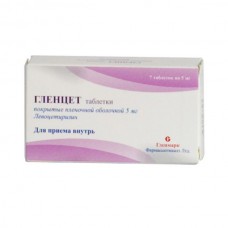Expiration date: 11/2026
Clinico-pharmacological group
(Blocker of histamine H1 receptors. Allergy medication)
Pharmachologic effect
Levocetirizine - cetirizine enantiomer, concurrency histamine antagonist, blocks histamine H1-receptor affinity which is 2 times higher than that of the cetirizine. It affects histamine-dependent step allergic reactions, reduces migration of eosinophils, vascular permeability, limits release of inflammatory mediators. It prevents the development and facilitates the allergic reactions, has antiexudative, antipruritic effect, practically no anticholinergic and antiserotoninovogo action. At therapeutic doses, sedation is very weakly expressed. The action starts after 12 minutes after receiving a single dose in 50% of patients after 1 hour - 95% and continues for 24 ch.FarmakokinetikaFarmakokinetika is linear. Quickly absorbed by ingestion, as poor reception does not affect the absorption of completeness, but reduces its speed. Bioavailability - 100%. Time to Cmax in the blood - 0.9 h, Cmax in the blood - 207 ng / ml. Vd - 0.4 l / kg. Binding to plasma proteins - 90%. Less than 14% of the drug is metabolized in the liver by O-dealkylation with a pharmacologically inactive metabolite. T1 / 2 -. 7.10 hours total clearance - 0.63 ml / min / kg. Completely eliminated from the body within 96 hours. Report the news (85.4%). In renal insufficiency (creatine clearance less than 40 mL / min), the clearance is reduced (in patients on hemodialysis - 80%), T1 / 2 - lengthened. Less than 10% removed during hemodialysis. Penetrates into breast milk.
Dosage
Inside, during a meal or on an empty stomach, with a little water, without chewing. The recommended dose for adults and children over 6 years, pozhilympatsientam (assuming normal renal function) - 5 mg (1 tab.) 1 times / day. In patients with chronic renal insufficiency c dose reduced by 2 times (1 tab. One day) at 30 QC to 49 ml / min and 3 times (1 tab. 3 days) at 10 QC to 29 ml / min. Patients with hepatic insufficiency correction mode is not required. The course of treatment for chronic diseases - up to 18 months.
Overdose
Symptoms: drowsiness in children - anxiety, irritability. Treatment: gastric lavage, activated charcoal, symptomatic therapy. No specific antidote. Hemodialysis is ineffective.
Drug interactions
Theophylline (400 mg / day) reduced total clearance levocetirizine 16%, while not changing the kinetics of theophylline. The combined use of macrolides or ketoconazole did not cause significant changes in the ECG. It may increase the effects of oppressive CNS and ethanol.
Pregnancy and lactation
The drug is contraindicated during pregnancy and lactation.
Side effects
- Possible side effects are listed below by body system and frequency of occurrence: often (> ,, 1/10), uncommon (> ,, 1/100, <10 = 1 ,, "" ,, 1/1000>, <,, 1 100 = ""> 000 10.1 ,, <January 1000 ,, = "" p = "">,
- CNS: rarely - headache, fatigue, drowsiness, rarely - fatigue, very rare - aggression, agitation, hallucinations, depression, convulsions.
- From the sensory organs: rarely - visual impairment.
- From the digestive system: rare - dryness of the oral mucosa, rarely - abdominal pain, rarely - nausea, diarrhea, hepatitis.
- Since the cardiovascular system: very rarely - tachycardia.
- With the respiratory system: very rarely - dyspnea.
- From the musculoskeletal system: very rarely - myalgia.
- On the part of metabolism: rarely - weight gain.
- Laboratory findings: very rarely - change of liver function tests.
- Allergic reactions: rarely - itching, rash, urticaria, angioedema, anaphylaxis.
Terms and Conditions of storage
The drug is stored in a dry dark place at temperatures not above 30 ° C. Keep out of the reach of children.
Shelf-life of the drug - 3 years. Do not use the drug after the expiry date.
testimony
- Urticaria, symptomatic treatment, including chronic idiopathic urticaria,
- Angioedema,
- Other allergic dermatitis, accompanied by itching and rash.
Contraindications
- Severe chronic renal failure (CRF CC less than 10 ml / min)
- Galactose intolerance, lactase deficiency and glucose-galactose malabsorption,
- Pregnancy,
- Lactation,
- Children under 6 years old,
- Hypersensitivity (including derivatives niperazina).
Precautions: chronic renal failure (requires correction mode), advanced age (perhaps decreased glomerular filtration).
special instructions
It requires compliance with caution when used together with alcohol.
Effects on ability to drive vehicles and management mechanisms
When an objective assessment noted no significant impact of the drug on the ability to drive vehicles and management mechanisms when taken in the recommended dosage. Nevertheless, during the period of ingestion it is advisable to refrain from activities potentially hazardous activities that require high concentration and psychomotor speed reactions.
Use in impaired renal function
Contraindicated in severe chronic renal failure (CRF CC less than 10 ml / min).
The caution in patients c chronic renal failure: the dose is reduced to 2 times (1 tablet a day.) With CC from 30 to 49 ml / min and 3 times (1 tab 3 days.) With CC from 10 to 29 ml / min.
Application for violations of liver function
Patients with hepatic insufficiency correction mode is not required.




